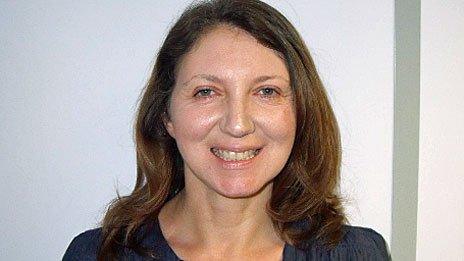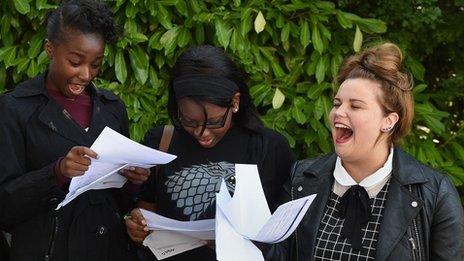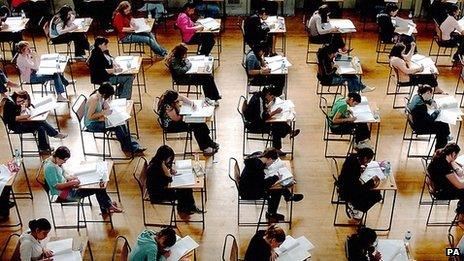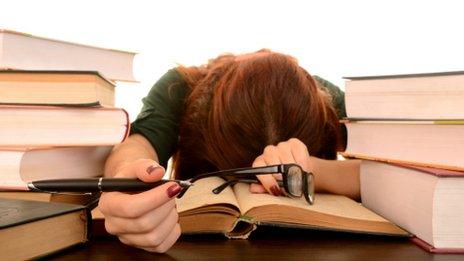Worried about your GCSE results? Ask the adviser
- Published

Julie Taylor, of the National Careers Service, can answer your questions
Hundreds of thousands of young people have received their GCSE results. Some will have done better than they expected; others will have had more disappointing news.
It can be a worrying time for families, reconsidering their plans and searching for alternative options.
Julie Taylor, of the National Careers Service, external, offers some expert advice.
YOUR QUESTIONS AND ANSWERS
I am a 16-year-old student. My results were four As, six Bs and a C. As the exams were linear and therefore harder this year, will employers be more lenient in considering grades? Abby, Clevedon
Well done for all your hard work with your coursework and exams, Abby.
It can be hard to know what the changes to GCSEs will mean for you, but try not to worry too much, as employers will take lots of things into consideration, including an applicant's GCSE results, their work experience and their written application or interview.
Some employers ask for five GCSEs at A*-C grades, so if you are applying for apprenticeships or a school leaver programme this year you should have lots of choices.
Exam boards and the marking system are checked and include moderation to ensure all papers are marked to the same standard, but if you do not feel your grades are right, speak to your school about options for re-marks.
I am in Year 11 and am interested in a career in engineering but am unsure which type of engineer I should be - maybe a design engineer, as my main aim is to improve daily life. What A-levels and degree should I take? Syed, London
Engineering is a great career choice with excellent prospects and a variety of routes available. You are right that there are lots of different types of engineers, and that design can impact how we live our lives every day. Browse the job profiles, external on the National Careers Service website, external to find out more about how engineers can work with food, electronics, spacecraft and more.
Important A-levels include maths and physics, and for design engineering you could also consider subjects such as design and technology, and computer science. You can then move on to a degree in engineering or design engineering. It is worth checking university entry requirements using the Ucas, external website. Apprenticeships are another route, including higher-level apprenticeships. Visit the Apprenticeships, external website for more information.
I am a parent worried about poorer results than expected because of all the changes forced on pupils. Will colleges take this into account if pupils don't quite achieve their required grades? Anne, West Sussex
It is understandable that you are worried, Anne, but there are always options available for students who do not perform as well as hoped. The key subjects are English and maths, so a student who doesn't achieve grade C or above will be given the opportunity to retake these qualifications (or an equivalent) either while completing a course of further education or as part of an apprenticeship.
Speak first to your preferred college to see whether they will accept your child on a course while allowing them to retake their GCSEs. If this is not possible, there are other options available for full-time study that will enable students to build up qualifications to GCSE level. However, each college has its own admissions policy so it might help to check this out first.
My daughter has A* in chemistry, A in biology, A in physics, B in maths - but Cs in English and three other subjects. She wants to study sciences and maths at A-level but was told she needed at least five Bs. What are her options? Donna
Congratulations to your daughter, Donna.
I am sorry to hear some of the results were disappointing. It is worth speaking to her school, if you have not already, to see if she is still able to start her preferred A-levels; possibly alongside a GCSE re-take, or in a different subject combination.
If not, you could search for the same subjects at another school or college using UCAS Progress, external and contact them to find out about places for this year.
You could look for a different type of course such as a BTEC, external, or your daughter could think about other options such as apprenticeships, external. The best option can depend on what her career plans are for the future. Contact a National Careers Service adviser on 0800 100 900 to talk things through.
My grandson is doing iGCSEs. What is the difference between GCSE and iGCSE? David, Cheshire
iGCSEs are now available quite widely. They are an equivalent level to GCSEs and are graded in the same way (A*-G). Unlike most GCSEs, subjects can be assessed by exam only, although coursework can be offered if the school chooses.
iGCSEs also allow for a relevant regional or international element to be included, as they originally began in international schools. After his iGCSEs, your grandson will have lots of options for his next steps, as they are recognised by employers, learning providers and Ucas, external.
Our lad was half a mark off his C. He has always found the subject hard. Why can't they round up for kids like him? Mark
It sounds like your son has done really well to score so highly if he doesn't find the subject easy.
The Uniform Mark Scale (UMS) is used to convert marks into grades and exam boards agree grade boundaries which means students must meet the exact boundary to achieve a particular grade.
To find out more about the specific grade boundaries for this qualification you will need to contact the relevant exam board, or you can find information about marking and grading on the Ofqual website, external.
I noticed that in English Literature I am one mark off A* and in physics two marks off. I am fine with the A but I wonder if it would be worth getting a re-count or re-mark to try and jump the boundary - or should I move on? Rebecca
It sounds as if you've got some excellent results there, Rebecca, congratulations. The decision about whether you want to try to gain the higher mark is completely yours but if you have the grades you need for a place on your chosen further education course or training, you may not need to get the grades looked at.
If you do want to check the grades, it would be best to speak with the school as soon as possible. They can decide whether it would be best to get a clerical check or a re-mark and let you know how much it will cost and request this before the deadline. You may have to pay per exam paper, not per subject, which will usually cost around £40 per exam. It is important to also note that your grade can go down, as well as up!
My son was five marks away from a C in maths. Should we ask for a re-mark? Jonathan
It can be really difficult for students to find out that they were very close to a particular grade, so I understand that you are thinking carefully about what to do next with your son's result in maths.
It might help to know that if he is planning to continue in full time study or an apprenticeship, then he will get support with re-taking a GCSE or equivalent in maths (and English, if he needs it) to achieve a grade C or above, so he will have another opportunity.
Are GCSE Art re-marks possible? I have heard boards will not re-mark individuals' results, only the results of a whole school if there is enough demand. Ellen
Getting results can be confusing enough, without having to understand all of the possibilities for challenging a result on top of that! The options for re-marks in GCSE art or art and design subjects can vary between exam boards, so speak to your school to find out what applies. There are deadlines for re-mark requests, so speak to the Exams Officer as soon as you can. Good luck!
My son, who is autistic, got A grades in maths, chemistry, physics and ICT as well as Bs and Cs in six other GCSEs but he did not achieve a C in English language. He has never coped with this as his autism seems to block any imaginative flow. Does he have to keep doing this subject as it leads to major stress and anxiety? John, Suffolk
Your son has got some really good results, and I can understand you wanting to avoid causing anxiety for him if possible.
Students aged 16-19 who do not hold a GCSE at A*-C in English (or maths) will need to continue studying these subjects whilst in further education or training, but there may be alternatives to a GCSE for your son.
Speaking to the school or college should help you to find out if they could offer him an iGCSE, Functional Skills instead or if there is additional support they can offer.
For further advice you could speak to Contact A Family , external about how the education system should support your son.
My daughter got an overall 'B' grade in GCSE science in year 10. She gained 'A's in both the written exam papers but a low 'C' in the controlled assessment. Do you think the school is at fault for failing to prepare her properly for the controlled assessment? Rod
Well done to your daughter on completing GCSE Science in year 10, Rod. Controlled assessment should give all students the same chance to produce a piece of work and could ask them to use different skills to those that are measured in the written exam.
It might be useful to talk to your daughter about the assessment itself and if you are able to talk to the school about your concerns it could help you decide whether you need to take any further action either with the school for internal assessment or with the exam board for external assessment.
- Published21 August 2014

- Published21 August 2014

- Published21 August 2014

- Published21 August 2014
